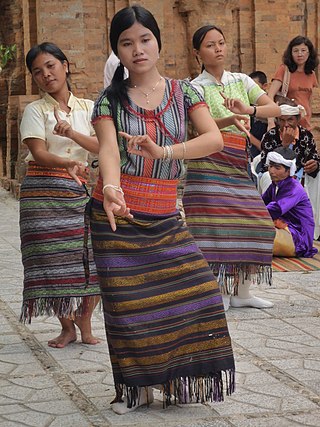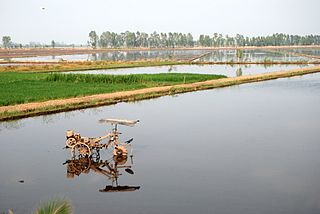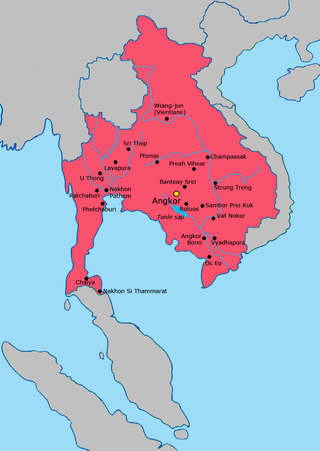Related Research Articles
The history of Cambodia, a country in mainland Southeast Asia, can be traced back to Indian civilization. Detailed records of a political structure on the territory of what is now Cambodia first appear in Chinese annals in reference to Funan, a polity that encompassed the southernmost part of the Indochinese peninsula during the 1st to 6th centuries. Centered at the lower Mekong, Funan is noted as the oldest regional Hindu culture, which suggests prolonged socio-economic interaction with maritime trading partners of the Indosphere in the west. By the 6th century a civilization, called Chenla or Zhenla in Chinese annals, firmly replaced Funan, as it controlled larger, more undulating areas of Indochina and maintained more than a singular centre of power.

The Mekong or Mekong River is a trans-boundary river in East Asia and Southeast Asia. It is the world's twelfth-longest river and the third-longest in Asia with an estimated length of 4,909 km (3,050 mi) and a drainage area of 795,000 km2 (307,000 sq mi), discharging 475 km3 (114 cu mi) of water annually. From its headwaters in the Tibetan Plateau, the river runs through Southwest China, Myanmar, Laos, Thailand, Cambodia, and southern Vietnam. The extreme seasonal variations in flow and the presence of rapids and waterfalls in the Mekong make navigation difficult. Even so, the river is a major trade route between western China and Southeast Asia. The construction of hydroelectric dams along the Mekong in recent decades causes serious problems for the river's ecosystem, including the exacerbation of drought.

The Chams or Champa people are an Austronesian ethnic group in Southeast Asia, and indigenous people of Central Vietnam.

Funan was the name given by Chinese cartographers, geographers and writers to an ancient Indianized state—or, rather a loose network of states (Mandala)—located in mainland Southeast Asia centered on the Mekong Delta that existed from the first to sixth century CE. The name is found in Chinese historical texts describing the kingdom, and the most extensive descriptions are largely based on the report of two Chinese diplomats, Kang Tai and Zhu Ying, representing the Eastern Wu dynasty who sojourned in Funan in the mid-3rd century CE.

Tonlé Sap is a lake in the northwest of Cambodia. It belongs to the Mekong River system. It is the largest freshwater lake in Southeast Asia and one of the most diverse and productive ecosystems in the world, designated as a Biosphere Reserve by UNESCO in 1997 due to its high biodiversity. Entering the 21st century, the lake and its surrounding ecosystems are under increasing pressure from deforestation, infrastructure development and climate change.

Cambodia or Kampuchea, officially the Kingdom of Cambodia, is a country in the southern Indochinese Peninsula in Southeast Asia, spanning an area of 181,035 square kilometres, bordered by Thailand to the northwest, Laos to the north, Vietnam to the east, and the Gulf of Thailand to the southwest. The capital and largest city is Phnom Penh.

The post-Angkor period of Cambodia, also called the Middle Period, refers to the historical era from the early 15th century to 1863, the beginning of the French protectorate of Cambodia. As reliable sources are very rare, a defensible and conclusive explanation that relates to concrete events that manifest the decline of the Khmer Empire, recognised unanimously by the scientific community, has so far not been produced. However, most modern historians have approached a consensus in which several distinct and gradual changes of religious, dynastic, administrative and military nature, environmental problems and ecological imbalance coincided with shifts of power in Indochina and must all be taken into account to make an interpretation. In recent years scholars' focus has shifted increasingly towards human–environment interactions and the ecological consequences, including natural disasters, such as flooding and droughts.
Milton Edgeworth Osborne, is an Australian historian, author, and consultant specializing in Southeast Asia.

The Mekong Delta, also known as the Western Region or South-western region, is the region in southwestern Vietnam where the Mekong River approaches and empties into the sea through a network of distributaries. The Mekong delta region encompasses a large portion of south-western Vietnam of over 40,500 km2 (15,600 sq mi). The size of the area covered by water depends on the season. Its wet coastal geography makes it an important source of agriculture and aquaculture for the country.

The Vietnamese people or the Kinh people, also recognized as the Viet people and informally the Viets, are a Southeast Asian ethnic group native to modern-day Northern Vietnam and Southern China. The native language is Vietnamese, the most widely spoken Austroasiatic language.
The Khmer people are an Austroasiatic ethnic group native to Cambodia. They comprise over 90% of Cambodia's population of 17 million. They speak the Khmer language, which is part of the larger Austroasiatic-language family found in parts of Southeast Asia, parts of central, eastern, and northeastern India, parts of Bangladesh in South Asia, in parts of Southern China and numerous islands in the Indian Ocean.

Phú Quốc is the largest island in Vietnam. Phú Quốc and nearby islands, along with the distant Thổ Chu Islands, are part of Kiên Giang Province as Phú Quốc City. The island has a total area of 574 km2 (222 sq mi) and a permanent population of approximately 179,480 people. Located in the Gulf of Thailand, the island city of Phú Quốc includes the island proper and 21 smaller islets. Dương Đông ward is located on the west coast, and is also the administrative and largest town on the island. The other ward is An Thới on the southern tip of the island.
The Khmer Krom are ethnically Khmer people living in or from the region of Tây Nam Bộ, the south western part of Vietnam. In Vietnam, they are recognized as one of Vietnam's fifty-three ethnic minorities: Vietnamese: Người Khmer and Người Cao Miên.
Benedict F. "Ben" Kiernan is an Australian-born American academic and historian who is the Whitney Griswold Professor Emeritus of History, Professor of International and Area Studies and Director of the Genocide Studies Program at Yale University.

Islam in Vietnam is primarily the religion of the Cham people, an Austronesian minority ethnic group; however, roughly one-third of Muslims in Vietnam are of other ethnic groups. There is also a community, which describes itself as of mixed ethnic origins, that practices Islam and is also known as the Cham, or Cham Muslims, around the region of Châu Đốc in the Southwest.

The largest of the ethnic groups in Cambodia are the Khmer, who comprise approximately 90% of the total population and primarily inhabit the lowland Mekong subregion and the central plains. The Khmer historically have lived near the lower Mekong River in a contiguous arc that runs from the southern Khorat Plateau where modern-day Thailand, Laos and Cambodia meet in the northeast, stretching southwest through the lands surrounding Tonle Sap lake to the Cardamom Mountains, then continues back southeast to the mouth of the Mekong River in southeastern Vietnam.
Operation Freedom Deal was a United States Seventh Air Force interdiction and close air support campaign waged in Cambodia between 19 May 1970 and 15 August 1973, as an expansion of the Vietnam War, as well as the Cambodian Civil War. Launched by Richard Nixon as a follow-up to the earlier ground invasion during the Cambodian Campaign, the initial targets of the operation were the base areas and border sanctuaries of the People's Army of Vietnam (PAVN) and the Viet Cong (VC).
The East–West Economic corridor is an economic development program initiated in order to promote development and integration of 5 Southeast Asian countries, namely: Myanmar, Thailand, Laos, Cambodia and Vietnam. The concept was agreed upon in 1998 at the Ministerial Conference of the Greater Mekong Subregion, organized in Manila, the Philippines. This corridor became operational on December 12, 2006.
The United Front for the Liberation of Oppressed Races waged a nearly three decade long insurgency against the governments of North and South Vietnam, and later the unified Socialist Republic of Vietnam. The FULRO insurgents represented the interests of indigenous Muslim and Hindu Cham, Montagnards, and Buddhist Khmer Krom against the ethnic Kinh Vietnamese. They were supported and equipped by China and Cambodia according to those countries' interests in the Indochina Wars.

Cambodian irredentism is a nationalist movement in Cambodia that refers to the land that used to be part of the Khmer Empire. The movement is aimed against Thai, Vietnamese, and Laotian control over the territories. Both official and unofficial Cambodian claims on territories viewed as having been under some form of Cambodian sovereignty are rhetorically tied back to an accused expansionism.
References
- Ives, Mike (8 December 2017). "Eluding Censors, a Magazine Covers Southeast Asia's Literary Scene". The New York Times.
- "The three year old Mekong Review magazine is thriving despite oppressive regimes in Southeast Asia". Radio National. 1 December 2018.
- Wright, George (8 February 2018). "Against the odds, the niche literary magazine Mekong Review finds its audience in Southeast Asia". Splice.